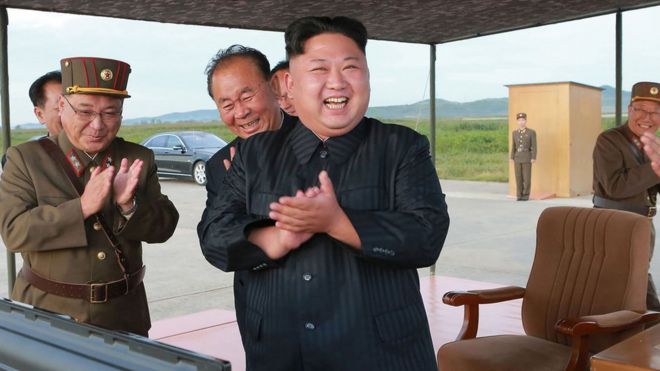North Korea says sanctions will accelerate nuclear programme
In a strongly worded statement, Pyongyang called a new set of UN sanctions "the most vicious, unethical and inhumane act of hostility".

Meanwhile, the presidents of the US and China committed to "maximising pressure" on the North through vigorous enforcement of UN resolutions.
Earlier, the US and South Korea carried out joint military exercises.
North Korea fired its latest missile over Japan on Friday. It travelled 3,700km (2,299 miles), putting the US Pacific territory of Guam, which North Korea says it has a plan to target, within reach.
The launch followed a fresh round of UN sanctions and was unanimously condemned by the UN Security Council as "highly provocative".
What has North Korea said?
The foreign ministry statement, carried by the country's official news agency KCNA, said: "The increased moves of the US and its vassal forces to impose sanctions and pressure on the DPRK [Democratic People's Republic of Korea] will only increase our pace towards the ultimate completion of the state nuclear force."
It also said that the goal of the new UN sanctions, approved on 11 September, was to "physically exterminate" the country's people, system and government.
- Is South Korea really planning to kill Kim Jong-un?
- Can the world live with a nuclear North Korea?
The sanctions are an attempt to starve North Korea of fuel and income for its weapons programmes, and restrict oil imports and ban textile exports.
The fresh measures followed the sixth and most powerful nuclear test conducted by Pyongyang earlier this month.
But some critics have raised questions over the effectiveness of the restrictions, as North Korea is still able to trade internationally.
The country's commerce with China, its main ally, was partially responsible for an estimated economic growth of 3.9% last year, Bloomberg news agency reports.
How is the world responding?
The issue of North Korea's weapons programme is expected to dominate US President Donald Trump's address at the UN General Assembly and his meetings with the leaders of South Korea and Japan.
Mr Trump previously warned that "all options" were on the table and that North Korea would face "fire and fury" if it continued to threaten the US.
In a phone call on Monday, Mr Trump and Chinese President Xi Jinping committed to "maximising pressure on North Korea through vigorous enforcement" of UN Security Council resolutions, the White House said.
Washington has repeatedly urged Beijing to take more direct action to rein in Pyongyang, while China says the US should refrain from issuing more threats.
- How do you defend against North Korea?
Russia has also criticised what it describes as "aggressive rhetoric" from the US.
China and Russia only agreed to the new UN sanctions after they were softened by Washington.
Meeting on the sidelines of UN General Assembly, the foreign ministers of both countries reaffirmed their call that the crisis should be resolved by diplomacy, a statement from Russia's foreign ministry said.
- North Korea crisis: What will Russia do?
- Three minutes to shelter from a missile
What about US-South Korea military drills?
The US military carried out an aerial military drill on Monday with South Korea near the border between the Koreas, the defence ministry in Seoul said.
The drill was to "demonstrate the deterrence capability of the US-South Korea alliance against North Korea's nuclear and missile threats", it added.
Defence Minister Song Young-moo told a parliamentary hearing that the exercises were being conducted "two to three times a month these days", Reuters news agency reports.
In other developments:
- China and Russia began a joint naval exercise east of the Korean peninsula but it is unclear if it is linked to current tensions in the region
- Spain said it was expelling the North Korean ambassador. The move follows similar decisions by Peru and Mexico and comes after the US urged international action against the country. Kuwait has reportedly decided to take the same measure
- US Defence Secretary Jim Mattis said at the Pentagon there were military options to address the North Korean crisis that would not put the South Korean capital, Seoul, at grave risk. But he declined to give details
- [BBC SOURCES]


No comments